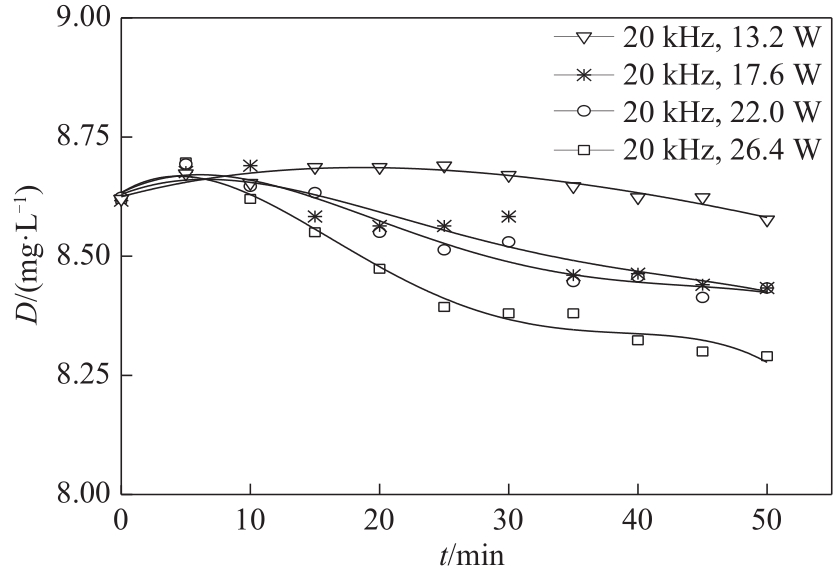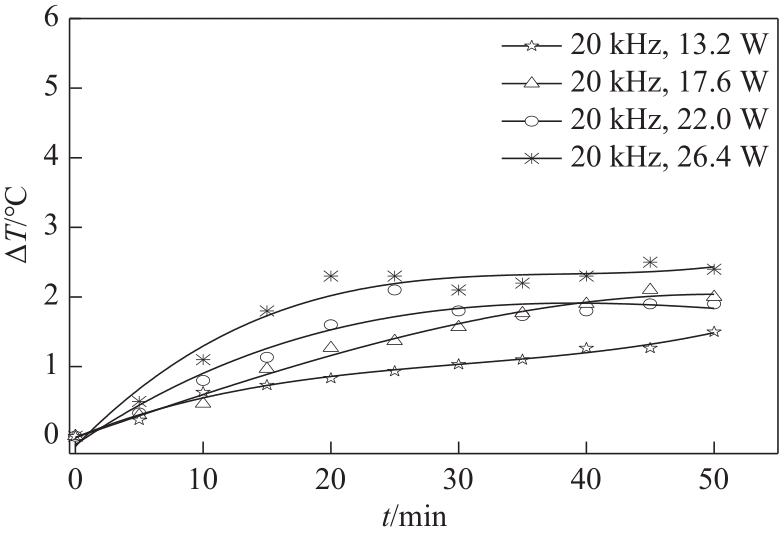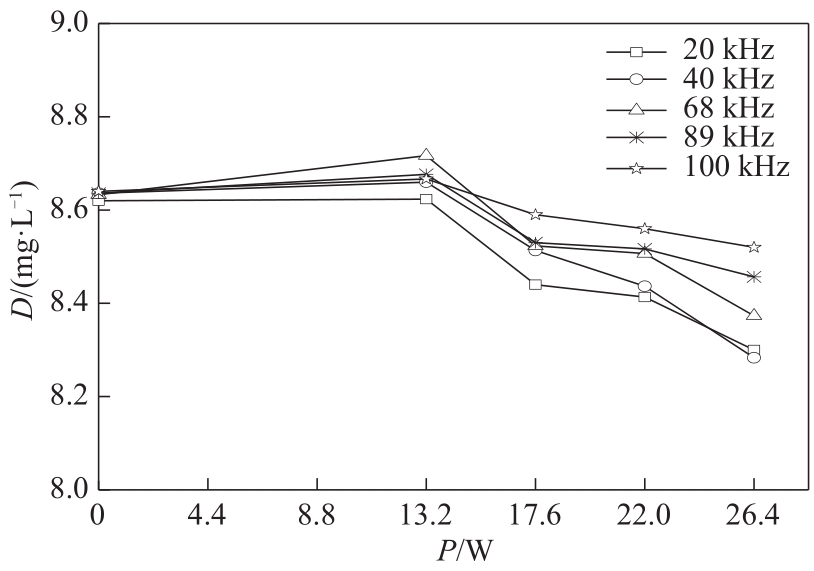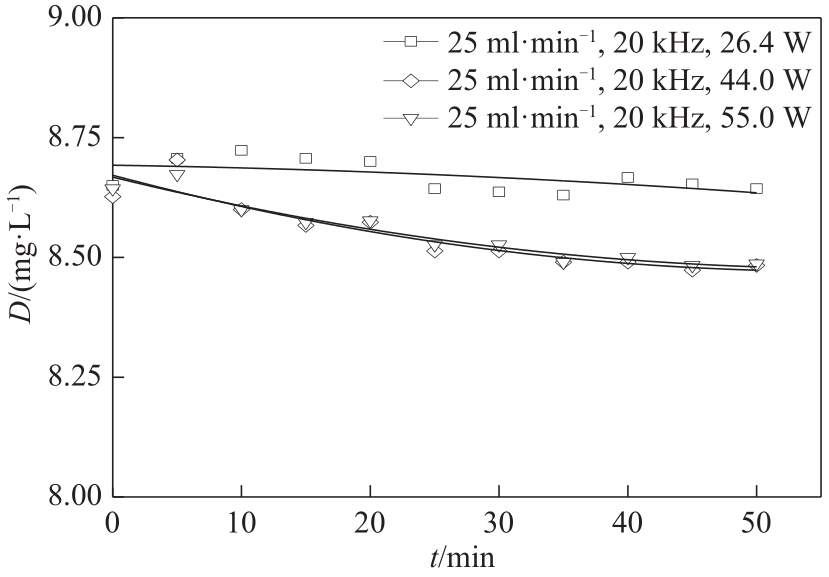CIESC Journal ›› 2023, Vol. 74 ›› Issue (4): 1693-1702.DOI: 10.11949/0438-1157.20221664
• Energy and environmental engineering • Previous Articles Next Articles
Qianqian WANG1( ), Mingyan LIU1,2(
), Mingyan LIU1,2( ), Yongli MA1
), Yongli MA1
Received:2022-12-29
Revised:2023-03-20
Online:2023-06-02
Published:2023-04-05
Contact:
Mingyan LIU
通讯作者:
刘明言
作者简介:王倩倩(1998—),女,硕士研究生,w17839148667@163.com
基金资助:CLC Number:
Qianqian WANG, Mingyan LIU, Yongli MA. Study on the effect of ultrasonic degassing in water[J]. CIESC Journal, 2023, 74(4): 1693-1702.
王倩倩, 刘明言, 马永丽. 水中超声波脱气的效应研究[J]. 化工学报, 2023, 74(4): 1693-1702.
Add to citation manager EndNote|Ris|BibTeX

Fig.3 Variation of dissolved oxygen concentration as a function of irradiation time during ultrasonic irradiation in the frequency range of 20—100 kHz

Fig.5 Variation of dissolved oxygen concentration as a function of irradiation time during ultrasonic irradiation in the ultrasonic electric power range of 13.2—26.4 W

Fig.6 Variation of temperature difference as a function of irradiation time during ultrasonic irradiation in the ultrasonic electric power range of 13.2—26.4 W

Fig.7 Dependence of the dissolved oxygen concentration on the ultrasonic electric power when water is irradiated with ultrasound at frequencies at 20—100 kHz

Fig.10 Variation of dissolved oxygen concentration as a function of irradiation time during ultrasonic under different ultrasonic electric power (25 ml·min-1)
| 1 | Eskin D G. Ultrasonic degassing of liquids[M]//Power Ultrasonics. Amsterdam: Elsevier, 2015: 611-631. |
| 2 | Eskin G I. Cavitation mechanism of ultrasonic melt degassing[J]. Ultrasonics Sonochemistry, 1995, 2(2): S137-S141. |
| 3 | Rozenberg L D. Physical Principles of Ultrasonic Technology[M]. New York: Plenum Press, 1973. |
| 4 | 徐晖. 超声波液相脱气原理及研究进展[J]. 安全与环境工程, 2014, 21(1): 62-68. |
| Xu H. Review for the theory and research status of ultrasonic degassing in liquid phase[J]. Safety and Environmental Engineering, 2014, 21(1): 62-68. | |
| 5 | Xu H B, Han Q Y, Meek T T. Effects of ultrasonic vibration on degassing of aluminum alloys[J]. Materials Science and Engineering: A, 2008, 473(1/2): 96-104. |
| 6 | Puga H, Barbosa J, Seabra E, et al. New trends in aluminium degassing—a comparative study[C]//Fourth International Conference on Advances and Trends in Engineering Materials and Their Applications. Hamburg, 2009. |
| 7 | 陶美君, 吴晓辉, 陆晓华, 等. 垃圾渗滤液中氨氮的超声处理研究[J]. 华中科技大学学报(城市科学版), 2005, 22(1): 70-72. |
| Tao M J, Wu X H, Lu X H, et al. Removal of ammonia nitrogen in the landfill leachate by ultrasonic treatment[J]. Journal of Wuhan Urban Construction Institute, 2005, 22(1): 70-72. | |
| 8 | 李威峥, 刘宝, 王海波, 等. 超声波除沫在工业废水处理中的应用[J]. 辽宁化工, 2021, 50(4): 493-496. |
| Li W Z, Liu B, Wang H B, et al. Application of ultrasonic defoaming in industrial wastewater treatment[J]. Liaoning Chemical Industry, 2021, 50(4): 493-496. | |
| 9 | Gondrexon N, Renaudin V, Boldo P, et al. Degassing effect and gas-liquid transfer in a high frequency sonochemical reactor[J]. Chemical Engineering Journal, 1997, 66(1): 21-26. |
| 10 | Asakura Y, Yasuda K. Frequency and power dependence of ultrasonic degassing[J]. Ultrasonics Sonochemistry, 2022, 82: 105890. |
| 11 | 谢迎春, 王倩倩, 马永丽, 等. 超声波与紫外线耦合脱气杀菌[J]. 化工进展, 2023, 42(3): 1629-1637. |
| Xie Y C, Wang Q Q, Ma Y L, et al. Ultrasonic and ultraviolet coupling degassing and sterilization[J]. Chemical Industry and Engineering Progress, 2023, 42(3): 1629-1637. | |
| 12 | Roy R A, Atchley A A, Crum L A, et al. A precise technique for the measurement of acoustic cavitation thresholds and some preliminary results[J]. The Journal of the Acoustical Society of America, 1985, 78(5): 1799-1805. |
| 13 | Nguyen T T, Asakura Y, Koda S, et al. Dependence of cavitation, chemical effect, and mechanical effect thresholds on ultrasonic frequency[J]. Ultrasonics Sonochemistry, 2017, 39: 301-306. |
| 14 | Suslick K S. The chemical effects of ultrasound[J]. Scientific American, 1989, 260(2): 80-86. |
| 15 | Beckett M A, Hua I. Impact of ultrasonic frequency on aqueous sonoluminescence and sonochemistry[J]. The Journal of Physical Chemistry A, 2001, 105(15): 3796-3802. |
| 16 | Mason T J, Cobley A J, Graves J E, et al. New evidence for the inverse dependence of mechanical and chemical effects on the frequency of ultrasound[J]. Ultrasonics Sonochemistry, 2011, 18(1): 226-230. |
| 17 | Lauterborn W, Mettin R. Acoustic cavitation[M]//Power Ultrasonics. Amsterdam: Elsevier, 2015: 37-78. |
| 18 | Naji Meidani A R, Hasan M. A study of hydrogen bubble growth during ultrasonic degassing of Al–Cu alloy melts[J]. Journal of Materials Processing Technology, 2004, 147(3): 311-320. |
| 19 | Sörensen C. Absorptions-, geschwindigkeits-und entgasungsmessungen im ultraschallgebiet[J]. Annalen Der Physik, 1936, 418(2): 121-137. |
| 20 | 薛娟琴, 兰新哲, 杜士毅, 等. 超声波作用下柠檬酸盐溶液中SO2的解吸机理[J]. 化工学报, 2007, 58(4): 944-950. |
| Xue J Q, Lan X Z, Du S Y, et al. Mechanism of SO2 ultrasonic desorption from citrate solution[J]. Journal of Chemical Industry and Engineering (China), 2007, 58(4): 944-950. | |
| 21 | Grieser F. Sonochemistry and the Acoustic Bubble[M]. UK: Elsevier, 2015. |
| 22 | Leighton T G. The Acoustic Bubble[M]. USA: Academic Press, 1994. |
| 23 | Neppiras E A. Acoustic cavitation[J]. Physics Reports, 1980, 61(3): 159-251. |
| 24 | Komarov S, Oda K, Ishiwata Y, et al. Characterization of acoustic cavitation in water and molten aluminum alloy[J]. Ultrasonics Sonochemistry, 2013, 20(2): 754-761. |
| 25 | Eller A, Flynn H G. Rectified diffusion during nonlinear pulsations of cavitation bubbles[J]. The Journal of the Acoustical Society of America, 1965, 37(3): 493-503. |
| 26 | Leong T, Collis J, Manasseh R, et al. The role of surfactant headgroup, chain length, and cavitation microstreaming on the growth of bubbles by rectified diffusion[J]. The Journal of Physical Chemistry C, 2011, 115(49): 24310-24316. |
| 27 | Mettin R, Luther S, Lauterborn W. Bubble size distribution and structures in acoustic cavitation[C]//2nd Conf. on Applications of Power Ultrasound in Physical and Chemical Processing. Toulouse, 1999: 125-129. |
| 28 | Monnier H, Wilhelm A M, Delmas H. Effects of ultrasound on micromixing in flow cell[J]. Chemical Engineering Science, 2000, 55(19): 4009-4020. |
| 29 | Eskin D G, Al-Helal K, Tzanakis I. Application of a plate sonotrode to ultrasonic degassing of aluminum melt: acoustic measurements and feasibility study[J]. Journal of Materials Processing Technology, 2015, 222: 148-154. |
| 30 | Xu H B, Meek T T, Han Q Y. Effects of ultrasonic field and vacuum on degassing of molten aluminum alloy[J]. Materials Letters, 2007, 61(4/5): 1246-1250. |
| 31 | Wang Q X, Manmi K. Three dimensional microbubble dynamics near a wall subject to high intensity ultrasound[J]. Physics of Fluids, 2014, 26(3): 032104. |
| 32 | Tuziuti T, Yasui K, Sivakumar M, et al. Correlation between acoustic cavitation noise and yield enhancement of sonochemical reaction by particle addition[J]. The Journal of Physical Chemistry A, 2005, 109(21): 4869-4872. |
| 33 | Kentish S, Ashokkumar M. The physical and chemical effects of ultrasound[M]//Feng H, Barbosa-Canovas G, Weiss J. Ultrasound Technologies for Food and Bioprocessing. New York: Springer, 2011: 1-12. |
| 34 | Ma Y H, Zeng Z J, Xu W L, et al. Directional transport and random motion of particles in ALF ultrasonic cavitation structure[J]. Ultrasonics Sonochemistry, 2021, 72: 105439. |
| 35 | Wu P F, Bai L X, Lin W J, et al. Mechanism and dynamics of hydrodynamic-acoustic cavitation (HAC)[J]. Ultrasonics Sonochemistry, 2018, 49: 89-96. |
| 36 | Parlitz U, Mettin R, Luther S, et al. Spatio-temporal dynamics of acoustic cavitation bubble clouds[J]. Philosophical Transactions of the Royal Society of London Series A: Mathematical, Physical and Engineering Sciences, 1999, 357(1751): 313-334. |
| 37 | Lauterborn W, Schmitz E, Judt A. Experimental approach to a complex acoustic system[J]. International Journal of Bifurcation and Chaos, 1993, 3(3): 635-642. |
| 38 | Leighton T G. Bubble population phenomena in acoustic cavitation[J]. Ultrasonics Sonochemistry, 1995, 2(2): S123-S136. |
| 39 | Ashokkumar M. The characterization of acoustic cavitation bubbles—an overview[J]. Ultrasonics Sonochemistry, 2011, 18(4): 864-872. |
| 40 | Apfel R E. Acoustic cavitation[M]//Methods in Experimental Physics. Amsterdam: Elsevier, 1981: 355-411. |
| 41 | Apfel R E. Acoustic cavitation prediction[J]. The Journal of the Acoustical Society of America, 1981, 69(6): 1624-1633. |
| 42 | Mettin R. Bubble structures in acoustic cavitation[M]//Doinikov A A. Bubble and Particle Dynamics in Acoustic Fields: Modern Trends and Applications. Kalala: Research Signpost, 2005: 1-36. |
| [1] | Weiqi JIN, Yuerong WU, Xia WANG, Li LI, Su QIU, Pan YUAN, Minghe WANG. Progress in infrared imaging detection technology and domestic equipment for industrial gas leakage in chemical industry parks [J]. CIESC Journal, 2023, 74(S1): 32-44. |
| [2] | Chao HU, Yuming DONG, Wei ZHANG, Hongling ZHANG, Peng ZHOU, Hongbin XU. Preparation of high-concentration positive electrolyte of vanadium redox flow battery by activating vanadium pentoxide with highly concentrated sulfuric acid [J]. CIESC Journal, 2023, 74(S1): 338-345. |
| [3] | Cheng CHENG, Zhongdi DUAN, Haoran SUN, Haitao HU, Hongxiang XUE. Lattice Boltzmann simulation of surface microstructure effect on crystallization fouling [J]. CIESC Journal, 2023, 74(S1): 74-86. |
| [4] | Mingkun XIAO, Guang YANG, Yonghua HUANG, Jingyi WU. Numerical study on bubble dynamics of liquid oxygen at a submerged orifice [J]. CIESC Journal, 2023, 74(S1): 87-95. |
| [5] | Ruitao SONG, Pai WANG, Yunpeng WANG, Minxia LI, Chaobin DANG, Zhenguo CHEN, Huan TONG, Jiaqi ZHOU. Numerical simulation of flow boiling heat transfer in pipe arrays of carbon dioxide direct evaporation ice field [J]. CIESC Journal, 2023, 74(S1): 96-103. |
| [6] | Shaohua ZHOU, Feilong ZHAN, Guoliang DING, Hao ZHANG, Yanpo SHAO, Yantao LIU, Zheming GAO. Experimental study of flow noise in short tube throttle valve and noise reduction measures [J]. CIESC Journal, 2023, 74(S1): 113-121. |
| [7] | Yifei ZHANG, Fangchen LIU, Shuangxing ZHANG, Wenjing DU. Performance analysis of printed circuit heat exchanger for supercritical carbon dioxide [J]. CIESC Journal, 2023, 74(S1): 183-190. |
| [8] | He JIANG, Junfei YUAN, Lin WANG, Guyu XING. Experimental study on the effect of flow sharing cavity structure on phase change flow characteristics in microchannels [J]. CIESC Journal, 2023, 74(S1): 235-244. |
| [9] | Yaxin ZHAO, Xueqin ZHANG, Rongzhu WANG, Guo SUN, Shanjing YAO, Dongqiang LIN. Removal of monoclonal antibody aggregates with ion exchange chromatography by flow-through mode [J]. CIESC Journal, 2023, 74(9): 3879-3887. |
| [10] | Meisi CHEN, Weida CHEN, Xinyao LI, Shangyu LI, Youting WU, Feng ZHANG, Zhibing ZHANG. Advances in silicon-based ionic liquid microparticle enhanced gas capture and conversion [J]. CIESC Journal, 2023, 74(9): 3628-3639. |
| [11] | Jie CHEN, Yongsheng LIN, Kai XIAO, Chen YANG, Ting QIU. Study on catalytic synthesis of sec-butanol by tunable choline-based basic ionic liquids [J]. CIESC Journal, 2023, 74(9): 3716-3730. |
| [12] | Song HE, Qiaomai LIU, Guangshuo XIE, Simin WANG, Juan XIAO. Two-phase flow simulation and surrogate-assisted optimization of gas film drag reduction in high-concentration coal-water slurry pipeline [J]. CIESC Journal, 2023, 74(9): 3766-3774. |
| [13] | Kaijie WEN, Li GUO, Zhaojie XIA, Jianhua CHEN. A rapid simulation method of gas-solid flow by coupling CFD and deep learning [J]. CIESC Journal, 2023, 74(9): 3775-3785. |
| [14] | Yubing WANG, Jie LI, Hongbo ZHAN, Guangya ZHU, Dalin ZHANG. Experimental study on flow boiling heat transfer of R134a in mini channel with diamond pin fin array [J]. CIESC Journal, 2023, 74(9): 3797-3806. |
| [15] | Zhewen CHEN, Junjie WEI, Yuming ZHANG. System integration and energy conversion mechanism of the power technology with integrated supercritical water gasification of coal and SOFC [J]. CIESC Journal, 2023, 74(9): 3888-3902. |
| Viewed | ||||||
|
Full text |
|
|||||
|
Abstract |
|
|||||